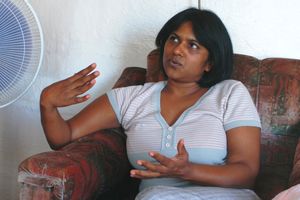Encounter with Linda Naicker
In Pietermaritzburg, Philippe Denis enabled us to meet Linda, one of his students. Like many black South Africans during apartheid, she started working right after high school. Only in 2006 did she start studying at university and today she’s busy working on her thesis about mixed couples under the apartheid regime…
Linda immediately accepted to contribute to the project and was very enthusiastic about it. She wanted us to find out about her culture, to meet her family and she welcomed us at her place during the whole day. More than just an interview, this day with Linda has been a great & memorable encounter. An encounter that ended up in a long term relationship as Linda is now a member of Ubumi and will even interview a young Indian for us!
Here are some extracts from her interview:
“I’m a South African Indian”

Apartheid
During the apartheid era we didn’t really know what we were missing as racism was so cleverly entrenched through apartheid propaganda.
However, we were a more militant generation than our parents and at some point we realized that we were oppressed. Indeed, our generation got a better education than our parents who never went to high school. We asked more questions like why are there only white people on TV. My parents’ generation on the other hand worshiped white people.
My aunt was in a relationship with a white man and they had children together. They had to hide to see each other as it was forbidden for them to live together. Their relationship was condemned by the “Immorality Act” and the “Prohibition of Mixed Marriages Act”: mixed couples were seen as outlaws! I remember that my aunt was always scared to be seen in public with her own children because they were fair skinned. She was afraid that the police would think that they were not her own children or that they would find out about her relationship with the children’s white father.

Freedom
It was when visiting Robben Island in 2000 that Mandela’s release from prison and freedom became real for me. I saw the lime quarry where he worked in terrible conditions with other political prisoners and I placed a stone on a heap in the quarry as a sign of respect and as a symbolic gesture that I too was done with hatred. I said to myself “Who am I not to forgive if he can do it after 27 years of imprisonment?” Then I decided to make my own contribution towards a better South Africa, but to reach this goal I needed to be educated first. This is why I started studying in 2006. I needed qualifications in order to help my community properly.

Future
My wish for the future would be that poverty be eradicated because poverty is the root of many other problems, such as domestic violence, HIV and AIDS, crime, etc.
I’ll do my best as many other South Africans to contribute to the success of the new South Africa. I have mixed feelings about the future of my country because while on the one hand people do get a better education; on the other hand, the majority of us remain poor. However, I choose to remain positive in the hope that as a people we WILL OVERCOME ADVERSITY.





/https%3A%2F%2Fstorage.canalblog.com%2F02%2F40%2F708429%2F103508011_o.jpg)
/https%3A%2F%2Fstorage.canalblog.com%2F89%2F98%2F708429%2F91609231_o.jpg)
/https%3A%2F%2Fstorage.canalblog.com%2F22%2F52%2F708429%2F91439966_o.jpg)
/https%3A%2F%2Fstorage.canalblog.com%2F22%2F93%2F708429%2F91386218_o.jpg)
/https%3A%2F%2Fstorage.canalblog.com%2F31%2F47%2F708429%2F53196445_o.jpg)
/https%3A%2F%2Fstorage.canalblog.com%2F11%2F57%2F708429%2F51916044_o.jpg)
/https%3A%2F%2Fstorage.canalblog.com%2F99%2F63%2F708429%2F51915207_o.jpg)
/https%3A%2F%2Fstorage.canalblog.com%2F93%2F25%2F708429%2F52536688_o.jpg)
/https%3A%2F%2Fstorage.canalblog.com%2F84%2F60%2F708429%2F50785003_o.jpg)